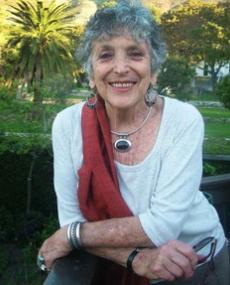
Ann-Marie Wolpe was born on 1 December 1930 in Johannesburg, Transvaal (now Gauteng), South Africa. She was the daughter of Abraham and Pauline (Braude) Kantor.
Wolpe was educated at the University of the Witwatersrand (Johannesburg) where she met her future husband, the late Harold Wolpe. They married in November 1955.
Harold Wolpe was arrested in July 1963 alongside Nelson Mandela and other African National Congress (ANC) members, who would eventually become known as the Rivonia trialists. Her brother, James Kantor a lawyer, was later also arrested but acquitted in the Rivonia trial.
She was a member of the South African Communist Party (SACP).
Her first job was working as an assistant to Helen Joseph in the Transvaal clothing industry medical aid society. Following this, she then ran a bursary fund for African students.
In 1963, Ann-Marie played a key role in planning the daring and dramatic escape from Marshall Square — in Johannesburg—police cells of her husband, Harold Wolpe, along with Arthur Goldreich, Mosie Moolla and Abdulhay Jassat. She smuggled tungsten blades in bread and other tools inside a roast chicken, which he used in his dramatic escape together with his three other comrades. She and her husband communicated through secret notes hidden in the collar of his shirts, which she was allowed to take home and launder.
However, her husband did not escape through filed-down prison bars. A warder, Johannes Greeff, was bribed to buy freedom for Harold and the three others – Arthur Goldreich, Mosie Moolla and Abdulhay Jassat.
The sensational prison break from Marshall Square has become known as South Africa’s Great Escape, making headline news and commemorated at Liliesleaf – headquarters of the ANC’s military wing uMkhonto weSizwe (MK) – on August 11.
Had the four not escaped, they would have been tried with Nelson Mandela and other Rivonia treason trialists, facing life in jail.
After his escape, Ann-Marie was arrested in an attempt to extract information about her husband. The authorities were furious at the brazen escape of these four political prisoners under their very noses. Humiliated by the escape, the police launched a huge manhunt with a £5 000 reward.
The next morning, at 7am, Ann-Marie was feeding her baby, Nicholas, when the police arrived. They said she had to come with them. She replied that she was feeding the baby. They refused to listen to her, saying ‘F*** the baby.’”
Her lifesaver was a nurse, Marlene, who had agreed to look after Nicholas if she was taken away by the police.
She was taken to Marshall Square. A brutal 10-hour interrogation, intimidation and torture followed. Wolpe was kept overnight, in a cell across from Ruth First.
Fearing re-arrest, she had no option but to leave the country. Their children Peta was six, Tessa five and Nick under six months.”
She fled on a one-way ticket to London, leaving her children in the care of family members, Marlene and the nanny Angelina.
Peta and Tessa followed weeks later. The three were reunited with Harold in October, after he had escaped to Swaziland in the boot of a car.
Baby Nicholas joined the family after he was well enough to travel.
Wolpe documented her story in meticulous detail in her memoir, The Long Way Home, which is now out of print.
In England, with very little money or experience, Wolpe managed to develop a career in academia and set up a home for her family. Her first academic job was at Bradford University in the unit for Yugoslav Studies.
The family lived in England until 1991. Like other exiles, they lived clandestinely, under surveillance. Wolpe established herself as a sociologist, feminist and author of a groundbreaking book, Feminism and Materialism, which, has recently been reprinted.
As was her engaging and energetic manner, she learnt Serbo-Croat – travelling to what was then Yugoslavia. This resulted in the family taking holidays on a tiny island off the coast of Yugoslavia.
When the family returned to London she obtained a position at what is now Middlesex University in the Development of Women's Studies programme where she later obtained her PhD. She spearheaded gender studies and was a founding member of the journal, Feminist Review, a leading voice on gender equality that started in 1979. She wrote three academic books on gender and education and one autobiography.
Ann-Marie was a member of the ANC’s welfare committee in London from 1988 until 1991.
On her return to South Africa in 1991 she worked first in the Centre for Adult and Continuing Education and then at the Education Policy Unit at the University of the Western Cape until she retired in 1998.
Wolpe then headed up the Gender Equity Task Team called for by the Minister of Education. As a result of its recommendations a Gender Equity Directorate was established in the National Department of Education.
Ann-Marie Wolpe passed away in her sleep on Wednesday 14 February 2018. She was 87 years old in Cape Town surrounded by her family.
Career
- 1951 - Social worker, Johannesburg City Council
- 1952 - 1954 - Supply teacher, Greater London (England) Council
- 1955 - 1959 - Administrative secretary, Transvaal Clothing Industry, Johannesburg, South Africa
- 1960 - 1963 - Organizing Institute of Race Relations
- 1966 - 1969 - Research assistant, University London
- 1969 - 1974 - Research fellow, Enfield College Technology, Middlesex, North Carolina, USA
- 1974 - 1991 - From lecturer to principal lecturer Middlesex Polytechnic, London
- 1991 - 1997 - Senior researcher, University Western Cape, Bellville, Western Cape, South Africa